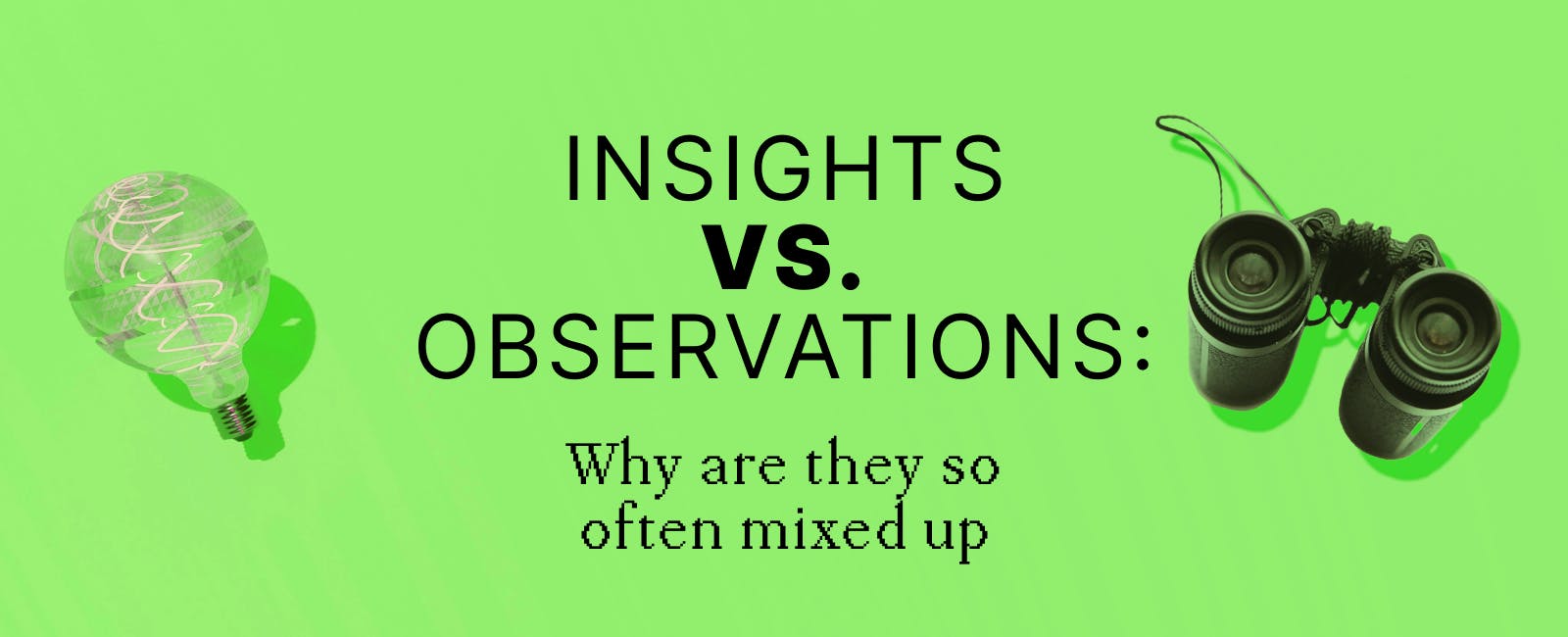
Insights VS. Observations: Why Are They So Often Mixed Up
March 5, 2024
I constantly come across strategy people that mention how often an insight and observation are misconstrued, misapplied, misinterpreted, and misused. The list goes on and on.
The good news is that, in this article, I’ll try my best to distinguish the two. I’ll also discuss why Insights are so coveted in this practice, and even argue about why we should remove them from the pedestal they are perpetually on - like a proper contrarian.
Consider this anecdote:
Friends at Ogilvy Africa articulated it pretty well: “An insight comes from an observation but is not an observation”
Begging the question, what is the actual definition of an insight? So I sprinted to my director. Here’s what she had to say:
An insight is a “A known but unspoken truth.” I thought that was pretty dialed in. For an observation I landed on something along the lines of “An action derived from a piece of noticing”. Just my take.
Recently the strategy team had an internal conversation. We chatted about insights and a few key themes kept coming up.
First, tension. Tension on the insight is important for the following reason (Julian Cole summed it up pretty well.) “Tension is inherently emotive. It provides your campaign with a hook because they are not just topical but resonate with your audience. This then becomes the motivator to drive your campaign forward.”
Adding tension in your strategy words can transform an insight that may be perceived as bland to something that can dramatize the unique selling proposition of your product and/or campaign.
The other key theme that came up, with Abby, a senior strategist on our team, was how the insight should reframe the consumer problem. It should also ”be humanized when you pressure test it.”
With all of that said, why are they still mixed up? Well, here’s my shot at contrasting them even further. Observations are the raw data that we gather from observing. Insights are the interpretations or revelations that are derived from those observations. In essence, insights provide meaning and context to the raw data, allowing us to uncover hidden truths and understand a human behavior more deeply.
The main purpose of the insight is to spark creativity and innovation, they serve the foundation upon which great ideas are built, (Ideally) guiding the creative team in crafting compelling narratives that would resonate with our target audience.
Here’s a quote from advertising legend Bill Bernbach: “Nothing is so powerful as an insight into human nature… what compulsions drive a man, what instincts dominate his action… if you know these things about a man you can touch him at the core of his being.”
Now that we have made the case for the insight, as promised, let’s provide the contrary and give you an alternative take.
I’ll say it:
The obsession with the insight has gone too far, to a point of no return. Martin Weigel notes how the insight acts as a milestone around our necks. The main case for why obsessing over insights could lead to detriment is how they turn into a thing rather than a process.
Because people ask “What’s the insight” endlessly, it puts a stress on the writer of that insight to deliver something that maybe sounds really cool but maybe, isn’t all that useful.
Take this excerpt from Martin Weigel’s article titled “Stop fetishing the insight”:
“Above all fetishising insights forgets that they have absolutely no intrinsic value and that they are no guarantee of anything. Unless acted upon and transformed by an idea of some kind, insight is worthless theory.”
Many strategists argue that insights should not be idolized or worshiped blindly. Their rationale is as with any “concept”. Insights have their limitations and can sometimes lead us astray if not used correctly. It's crucial to maintain a healthy skepticism and critical mindset when working with insights, questioning their validity and pressure testing them against the consumer problem you’ve identified in your research.
Putting too much emphasis on insights is how it leads us to prioritize being clever over being useful. I liked the metaphor from Martin about pretending to be armchair psychologists, trying to unravel the mysteries of the human mind with fancy research methods. In reality, the “simple” one liner from the gut can do the job just as well. But, that’s just a thought.

